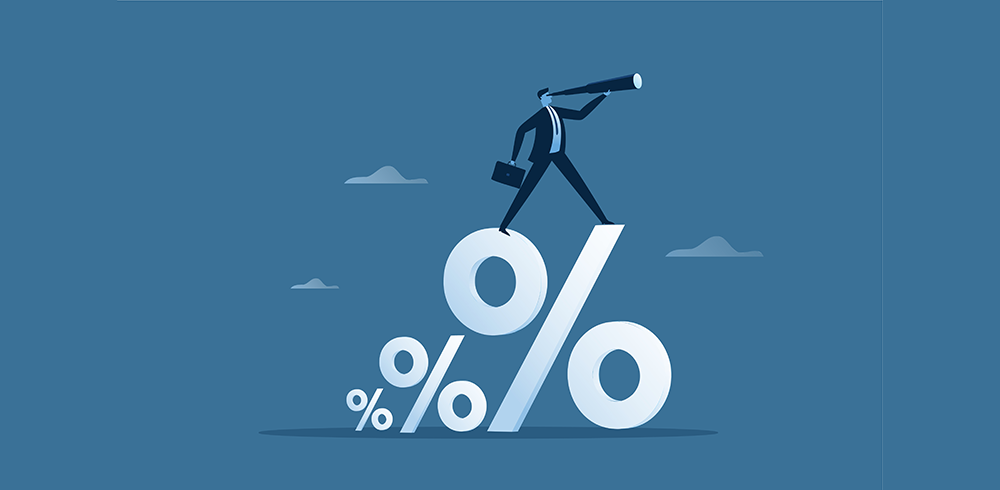When you avail a personal loan, you must consider various factors like your existing debt, the loan amount and tenure, your ability to repay the loan, and the type of interest charged by the lender- fixed interest rate or floating interest rate.
Understanding the type of interest rate is crucial as this will impact your personal loan repayment amount. Here, we will talk in detail about floating interest meaning, how it works, the factors affecting the floating interest rate and how it is different from the fixed interest rate.
What is a Floating Interest Rate?
Otherwise called a variable interest rate, a floating interest rate, in simple words, is the interest rate that can change over a period of time. Unlike fixed interest rates, it is not constant and hence, it fluctuates on the basis of various factors such as market conditions, central bank policies, etc.
How Does Floating Interest Rate Work?
Floating interest rates are often based on a benchmark rate. Let’s understand it with an example. Consider, you take out a loan with a floating interest rate. Now, in this scenario, let’s keep it at 5%. This 5% would be the prime rate which you would be paying on your loan initially. However, if the market conditions fluctuate and the prime rate changes to 7%, then you would be bound to pay a 7% interest rate on your loan. This would however change your monthly payment, keeping the repayment schedule the same.
When is a Floating Interest Rate Relevant?
A floating interest rate can be helpful in many situations, some of which are as follows:
- When Interest Rates Are Falling: If interest rates are going down in the market, a floating rate can save you money as your monthly payments would decrease.
- For Short-Term Loans: If you are taking a loan for a short period, interest rate changes may not affect you much, and you could benefit from a lower rate at the start.
- If You Can Handle Some Risk: Floating rates are good for those who are okay with changes in their monthly payments. If your budget allows for some flexibility, this may be a good option.
- In a Competitive Market: Sometimes, lenders offer better deals with floating rates.
Factors Affecting Floating Interest Rate
Here are some factors that are responsible for changing the floating rate:
- Economic conditions (it may include inflation, unemployment, GDP growth, etc.)
- Central bank policies (monetary policies set by central banks)
- Market conditions (perceptions of investors in the market)
- Credit risk (your creditworthiness)
Also Read: How Having Multiple Credit Cards Can Affect Your Credit Score
Floating Interest Rate Vs Fixed Interest Rate
| Aspect | Floating Interest Rate | Fixed Interest Rate |
|---|---|---|
| Flexibility | Flexible as the interest rate may change as per market conditions. | No flexibility as payment remains the same throughout the loan tenure |
| Protection against interest hike | No protection | Provides protection against interest hikes |
| Monthly payments | Changes as per change in interest rate | Remains constant |
Pros of Floating Interest Rate
- Floating rates allow you to take advantage of falling interest rates and this helps in saving on interest payments.
- In a low-rate environment, floating rates may offer lower initial payments compared to fixed rates.
- Floating rates are always according to the current market conditions
Cons Of Floating Interest Rate

- You can face the risk of rising interest rates and this can lead to higher monthly payments and increased borrowing costs.
- It becomes harder for you to budget and plan for future expenses during market fluctuations.
Also Read: Emergency Personal Loans: What You Need to Know
Who Should Opt for a Floating Interest Rate?
Opting for a floating interest rate completely depends on your situation and how comfortable you are with changes in your loan payments. Here are some situations where you can consider a floating rate:
- If you think interest rates will go down in the future, choosing a floating rate can help you save money.
- If you can manage changing monthly payments and adjust your budget as needed, a floating rate might be the right choice for you.
- For short-term loans, such as personal loans with a short duration, a floating rate can be a good option as the risk of rates going up is lower.
- Investors and business owners, who want to take advantage of lower rates.
Conclusion
So, now that you understand floating interest rates and how they are different from fixed interest rates, you can make your decision wisely while opting for a personal loan, two-wheeler loan, etc. Consider your financial goals, risk tolerance, and market conditions before going with a fixed interest rate or floating interest rate. Always weigh the pros and cons of your decision before coming to a conclusion.
FAQs
1. What is an example of a floating interest rate?
A floating interest rate is when your loan’s interest rate changes over time. For example, if you take a home loan with a floating rate, it may get linked to the bank’s lending rate. If that rate goes up or down, then your loan’s interest rate will also change.
2. Which is better, a floating or fixed interest rate?
It all depends on your needs. A floating rate can save you money when interest rates drop, but your payments can also go up if rates rise. A fixed rate is better if you wish to have steady payments.
3. Do credit cards have floating interest rates?
Yes, most credit cards have floating interest rates. This means the interest you pay can change based on the prime rate or the rate set by your credit card company.








